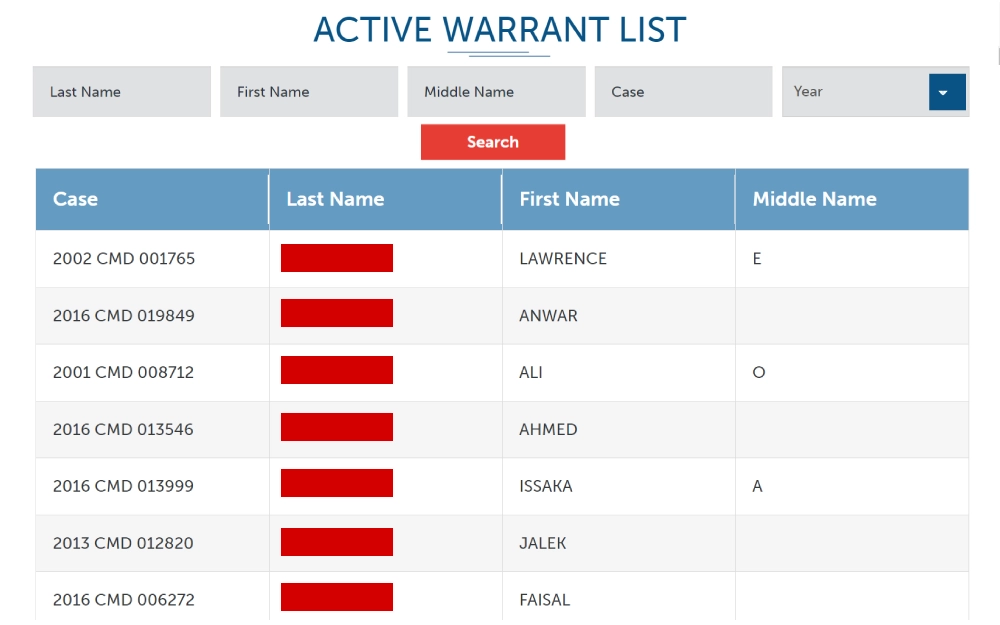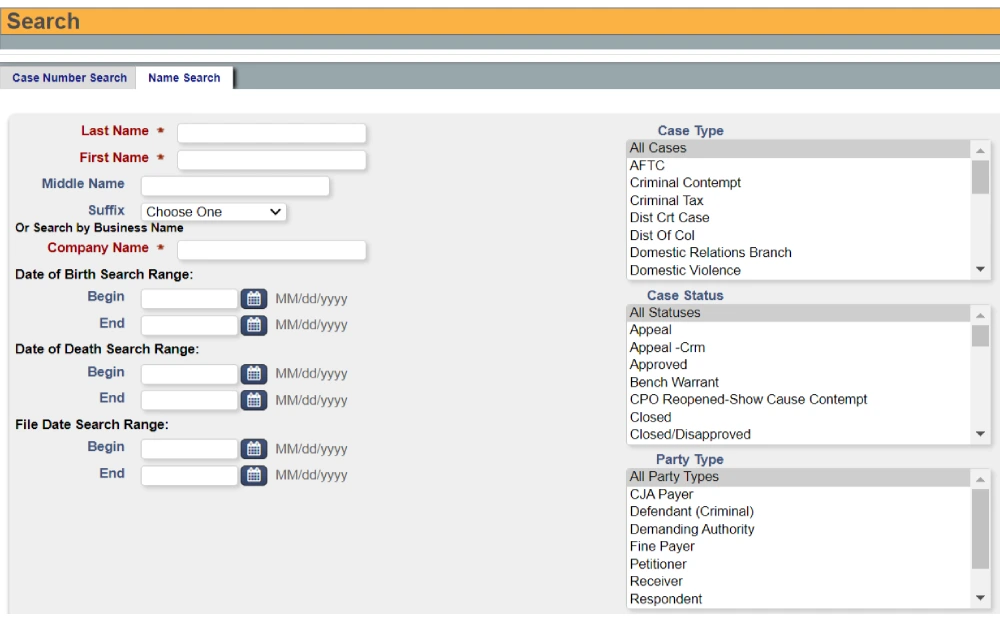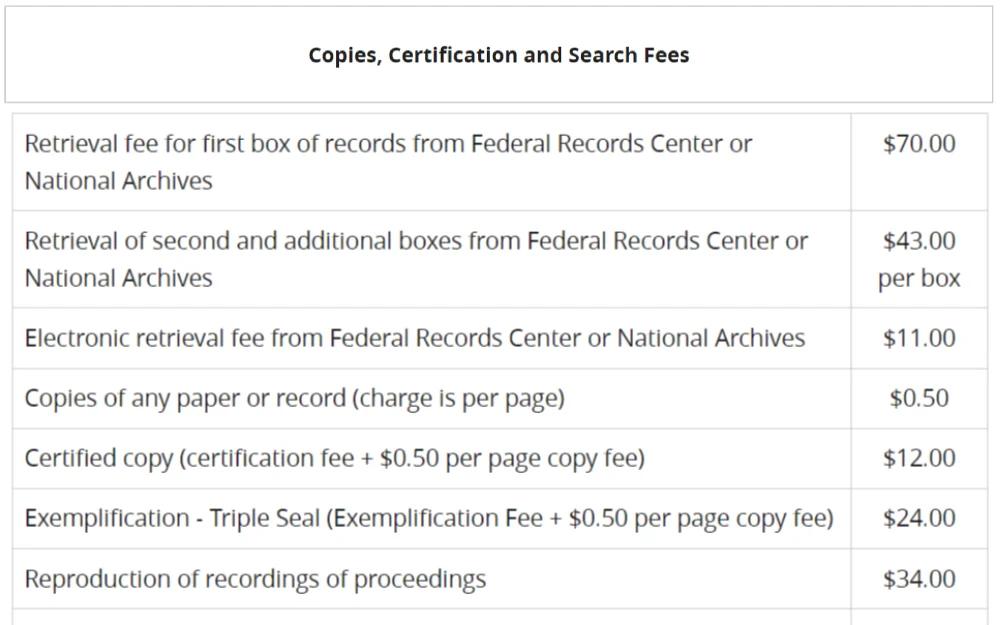Perform a free Washington D.C. warrant search to determine if you or someone you know is wanted. There are several different records custodians that interested parties can check with to access warrant information.
Searchers may benefit from knowing that warrants involve both arrests and searches; they are legal documents that grant a law enforcement agency or court the authority to bring someone into custody or search a place.
Discover how to look up warrant information in Washington, D.C., using this streamlined resource for guidance.
Are Washington D.C. Warrants Available for Citizens To View?
According to the District of Columbia Freedom of Information Act, generally anyone has access to public records maintained by a government agency.1 Because warrants are created and maintained by law enforcement agencies and courts, they are public records.
There are exemptions to the District of Columbia Freedom of Information Act. The exemptions that are relevant to warrants are laid out under DC Code § 2-534(3) which deals with records compiled for law enforcement purposes.2
Essentially, it says that records may not be disclosed to the extent that disclosure would interfere with law enforcement proceedings, and investigations, or violate constitutional protections like the right to a fair trial or personal privacy.
A Washington D.C. arrest warrant would generally not trigger these exemptions, as warrants eventually become public records after they are issued because they begin the process of criminal cases heard in public courts. A search warrant would generally not be a public record as its sole purpose is to further an investigation, and disclosure of it would most likely cause interference.
In the event that a warrant issued in Washington D.C. would trigger non-disclosure based on the exemption law, law enforcement agencies can redact information that would cause the issue. As such, warrants are available for citizens to view and there are options for viewing them outlined below.
Locating Details of Wanted Persons in the District of Columbia (Washington D.C. Warrant Search)
Anyone can check for warrants as long as they have some basic information.
For starters, interested persons should know the individual named on the warrant’s first and last name. People often have common names shared by other people, so knowing the date of birth and the county or city in which they reside will narrow the search.
Researchers should also know which federal or local government agency issued or executed the warrant. A bench warrant in Washington D.C. is different from a criminal arrest warrant, so researchers would be wise to know the difference and find out how to contact the issuing agency.
In the event that a researcher does not know which agency issued a warrant, they can rest assured that searching local agencies will encompass the broadest scope because Washington D.C. is a small region. Because the region is not a state there are no state-wide agencies. However, because Washington D.C. is the United States capital, there are several federal agencies located within the city.
They may also have Washington D.C.-specific field offices that can be searched to check for federal warrants.
In Washington D.C., a warrant search can be conducted by checking with the District of Columbia Courts and the Metropolitan Police Department. The FBI local field office and the D.C. federal court may also be searched when looking for warrant information. Learn how to search these agencies in the section below.
How To See if You or Someone Else Has a Warrant in Washington D.C. for Free
Interested parties can begin their warrant search with the District of Columbia Courts.3 The District of Columbia Courts include the Superior Court and the Court of Appeals. The Superior Court is the only trial court in the region, which means that all criminal cases are heard by this court.
A felony warrant and misdemeanor warrant that leads to a criminal case will be included in a case filed in this court. The Superior Court also hears traffic violation cases.
The Superior Court maintains an active warrant list that displays the names and case numbers.4 The individuals on this list are fugitives and will likely be arrested upon detection or turning themselves in. The list is in alphabetical order, but researchers may also search by name and year the warrant was issued.

The Superior Court also provides the public with a free arrest warrant check through its online eAccess System.5 This database allows anyone to search criminal cases and bench warrants issued by the court.

To use the search function, researchers can search by case number or name. It is unlikely that a researcher will know a case number, but by selecting the ‘Name Search’ tab, they can input an individual’s first and last name to begin the search. They can further narrow the results by case type, like if they know whether a warrant stemmed from a felony or misdemeanor.
They may also search exclusively for bench warrants under the ‘Case Status’ section.
The results will generate a list of individuals with the same name as the person you input into the search. It will offer details on every criminal case that has not been expunged or sealed. Researchers will immediately have access to the case number, case status, case type, filing date, and more.
Clicking on the case number will reveal additional information, including:
- Offense
- Case Disposition
- Judge
- Bond Information
The Superior Court does not offer clear instructions on how to gain access to criminal case files. Researchers should contact the court for more information.6 The Superior Court is open 8:30am to 5:00pm Monday – Friday.
Washington D.C. Superior Court
Moultrie Courthouse
500 Indiana Avenue, Northwest, Suite 2500
Washington, D.C. 20001
Phone: 202.879.1400
Obtain Arrest Warrant Details via the Metropolitan Police Department
Interested parties can also perform a Washington D.C. warrant lookup through the Metropolitan Police Department.7 This law enforcement agency services the region by enforcing laws, making arrests, generating police reports, issuing arrest warrants, and executing bench warrants issued by the Superior Court.
As mentioned above, arrest warrants are public records in Washington D.C. and they are generally made available after service.
The Metropolitan Police Department is part of the District of Columbia government. Interested parties can request police records through the District of Columbia Freedom of Information Act Public Access Portal.8
Interested parties must create a portal account online to submit a request. Through the portal, you can also check the status of the request. The District of Columbia has a maximum of 15 days to respond to the request.
After paying the applicable fees, you can download the police record directly from the portal site.
For more information, contact the Metropolitan Police Department.9 The office is open 8:15am to 4:45 pm Monday – Friday.
Metropolitan Police Department
441 Fourth Street, NW, Seventh Floor
Washington, D.C. 20001
Phone: 202.727.9099
Email: [email protected]
Expand Your Search Beyond D.C. & Access Federal Warrants
Researchers can expand their warrant search in Washington D.C. through federal resources as well. The FBI Washington D.C. field office provides a free wanted list with information on fugitives.10

Researchers can view fugitives that the Washington D.C. field office is seeking information on, the violent crimes they are alleged to have committed, cyber terrorism, and much more.
Researchers can also check for federal warrant information through the agencies mentioned below.
- DEA Fugitives List: A list of individuals alleged to have committed federal drug offenses. Users may click on the photos of these individuals to view their name, aliases, photo, physical characteristics, specific drug offenses alleged to have been committed, and reward amount for information that leads to the capture of fugitives on the list.
- FBI Ten Most Wanted Fugitives: The 10 most wanted individuals alleged to have committed violent federal offenses. It provides their name, photo, physical characteristics, detailed description of the offenses committed, and a reward amount for information that leads to their capture.
- U.S. Marshals 15 Most Wanted Fugitives: 15 of the most wanted people who have committed violent offenses and either escaped incarceration or police custody, or skipped a court appearance.11 The list allows members of the public to view their name, photo, physical characteristics, and detailed description of incidents that caused them to be fugitives. There is also an award amount listed for their capture.
All of the individuals on the above lists are described as armed and dangerous. If you have information about the whereabouts of a fugitive, contact the appropriate federal agency or your local police department.
The United States District Court District of Columbia has jurisdiction over federal criminal cases.12

Interested persons can view criminal case files online through the Public Access to Court Electronic Records (PACER), or in person in the Clerk’s Office. The Clerk’s Office is open 9:00am to 4:00pm Monday – Friday excluding federal holidays. Search fees are $0.10 per page and $3 per complete document.13
United States District Court District of Columbia
Clerk of Court
333 Constitution Ave. NW
Washington, D.C. 20001
Phone: 202.354.3080
Various Types of Warrants in Washington D.C. & What They Mean
Washington D.C. Code § 23–561 describes arrest warrants and their requirements by law.14 They must include the name of the person to be arrested and the description of the offense charged. There are no Washington D.C. warrant roundups.
There are various types of warrants that researchers should be aware of. However, you can learn about the different types of warrants below.
Arrest Warrants: Official documents that announces the reason a person is being detained and brought before a court.
Bench Warrants: Arrest warrants, but only served in the event a person misses their appointed court date.
Probation & Parole Violation Warrants: Signed by a judge when they learn that a person has violated the conditions of their release.
Traffic Warrants: Documents issued to individuals accused of violating a traffic law.
Child Support Warrants: When a person fails to pay child support without just cause, they can be placed under arrest.
Capias & Capias Pro Fine Warrants: Courts can issue this arrest warrant when a person fails to pay a fine.
Fugitive Warrants: This is an outstanding arrest warrant for serious offenders who have not yet been brought into custody.
Search Warrants: When a criminal case is underway, law enforcement agencies get these warrants that allow them to look for specific evidence in places.
Actions To Consider if You or Someone Else Faces an Arrest Warrant in Washington D.C.
Finding out that you or someone you know has a warrant out for their arrest can be a troubling feeling. There are times when an individual has obtained a bench warrant for missing a court date, which can lead to their immediate arrest upon detection.
If you discover that you have an active arrest warrant you should probably contact a criminal defense attorney. They may be able to advise you on booking procedures, bail, and pretrial matters. You should also consider turning yourself into the Metropolitan Police Department.
You will most likely be arrested, but you will not be considered a fugitive.
If someone you know has a warrant out for their arrest, you should let them know only if you believe it is safe to do so. Some people may be fugitives by choice and dangerous. You have the right to contact law enforcement in this situation.15
Warrants are serious business and can result in an arrest and detainment. Learn how to effectively conduct a free Washington D.C. warrant search using this resource, and expand your search to include accessing District of Columbia arrest and crime records or finding all free D.C. public information.
References
1Council of the District of Columbia, D.C. Law Library. (n.d). § 2–532: Right of access to public records; allowable costs; time limits. Retrieved December 11, 2023, from <https://code.dccouncil.gov/us/dc/council/code/sections/2-532>
2Council of the District of Columbia, D.C. Law Library. (n.d). § 2–534: Exemptions from disclosure. Retrieved December 11, 2023, from <https://code.dccouncil.gov/us/dc/council/code/sections/2-534>
3District of Columbia Courts. (n.d). About. Retrieved December 11, 2023, from <https://www.dccourts.gov/about>
4District of Columbia Courts. (n.d). Active Warrant List. Retrieved December 11, 2023, from <https://www.dccourts.gov/services/active-warrant-list>
5District of Columbia Courts. (n.d). eAccess System. Retrieved December 11, 2023, from <https://eaccess.dccourts.gov/eaccess/home.page.4>
6District of Columbia Courts. (n.d). About the Superior Court. Retrieved December 11, 2023, from <https://www.dccourts.gov/superior-court/about>
7Metropolitan Police Department. (n.d). Submit a FOIA Request to MPD. Retrieved December 11, 2023, from <https://mpdc.dc.gov/node/1672206>
8District of Columbia Government. (n.d). Freedom of Information Act Public Access Portal. Retrieved December 11, 2023, from <https://foia-dc.gov/App/Index.aspx>
9Metropolitan Police Department. (n.d). Hotlines, Tip Lines and Important Numbers. Retrieved December 11, 2023, from <https://mpdc.dc.gov/service/hotlines-tip-lines-and-important-numbers>
10Federal Bureau of Investigation. (n.d). Wanted by the FBI. Retrieved December 11, 2023, from <https://www.fbi.gov/contact-us/field-offices/washingtondc/wanted>
11United State Marshals Service District Office. (n.d). 15 Most Wanted Fugitives. Retrieved December 11, 2023, from <https://www.usmarshals.gov/what-we-do/fugitive-investigations/15-most-wanted-fugitive>
12United States District Court for the District of Columbia. (n.d). Court Records. Retrieved December 11, 2023, from <https://www.dcd.uscourts.gov/court-records>
13Public Access to Court Electronic Records. (n.d). PACER Pricing: How fees work. Retrieved December 11, 2023, from <https://pacer.uscourts.gov/pacer-pricing-how-fees-work>
14Council of the District of Columbia, D.C. Law Library. (n.d). Subchapter IV – Arrest Warrant and Summons. Retrieved December 11, 2023, from <https://code.dccouncil.gov/us/dc/council/code/titles/23/chapters/5/subchapters/IV>
15Metropolitan Police Department. (n.d). Covered Federal Law Enforcement Agencies. Retrieved December 11, 2023, from <https://mpdc.dc.gov/page/covered-federal-law-enforcement-agencies>
